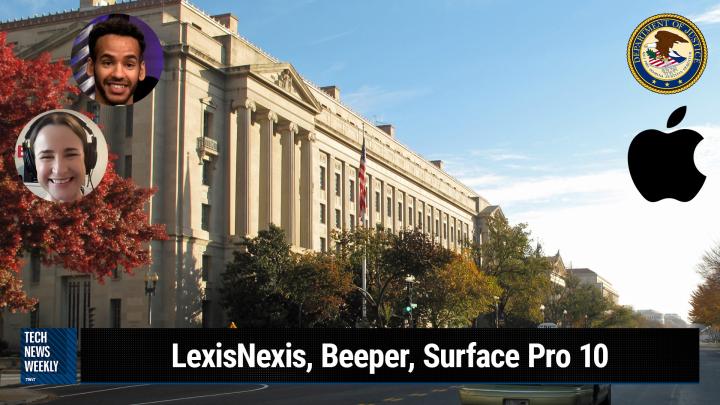Apple Sued by US DOJ for Alleged Smartphone Monopoly Practices
AI-Generated. Human edited.
In a seismic move that could reshape the smartphone industry, the US Department of Justice (DOJ) has filed a blockbuster antitrust lawsuit against Apple, accusing the tech behemoth of illegally maintaining a monopoly over the mobile device market. On Tech News Weekly, host Mikah Sargent and guest co-host Jennifer Pattison Tuohy of The Verge delved into the intricate details of the DOJ's case against Apple and its far-reaching implications.
The case, which promises to be a protracted legal battle, alleges that Apple has exploited its dominant position to stifle competition, limit consumer choice, and extract exorbitant fees from developers and content creators. At the heart of the government's complaint lies the assertion that Apple has leveraged its control over the iOS ecosystem to unfairly disadvantage rival products and services.
"Basically, they're accusing Apple of illegally monopolizing the smartphone market and using its position to extract more money from consumers, developers, content creators, artists, publishers, small businesses, and merchants," Tuohy explained, summarizing the crux of the DOJ's allegations.
The lawsuit zeroes in on several key areas where Apple's practices are alleged to be anti-competitive. These include disrupting "super apps" that offer multiple services, blocking cloud gaming platforms, suppressing cross-platform messaging quality between iPhones and Android devices (the infamous "green bubble, blue bubble" divide), limiting third-party smartwatch functionality, and preventing the development of alternative digital wallets to challenge Apple Pay.
While Apple has vehemently denied the charges, asserting that the lawsuit threatens its core principles and ability to innovate, the case has already sent shockwaves through the tech industry and reignited the broader debate surrounding the regulation of big tech giants.
Tuohy astutely contextualized the lawsuit as part of a broader societal shift, where technology has become so deeply embedded in our daily lives that it necessitates a reassessment of the power wielded by companies like Apple. "Mobile phones are so important to everyday life now, much more so than they were even 10 years ago," she remarked. "You have to have these devices. So, we really do need some form of government regulation over some of these areas to make sure that everyone can have access to what is essentially now become incredibly essential to day-to-day life."
Sargent echoed similar sentiments, drawing parallels with the earlier era of Hollywood and the music industry, which proactively established self-regulatory bodies to preempt intrusive government intervention. He expressed surprise that the tech giants followed a different path, opting instead to resist external oversight once faced with lawsuits and regulatory crackdowns.
As both Sargent and Tuohy explored the nuances of the case, a recurring theme emerged: the delicate balance between fostering innovation and ensuring fair competition in a rapidly evolving technological landscape. While Apple's detractors argue that its monopolistic practices have stifled consumer choice and innovation, the company maintains that unbridled regulatory intervention could undermine its ability to deliver integrated hardware, software, and service experiences that consumers have come to expect.
The DOJ's lawsuit against Apple promises to be a legal marathon, with ramifications that could reverberate far beyond the smartphone industry. As Tuohy aptly noted, "This is going to be a huge story for probably the next decade." The outcome of this high-stakes battle will not only shape the future of the mobile device market but also set crucial precedents for how the government approaches the regulation of technology companies that have become indispensable to modern life.
With the stakes this high, the Apple antitrust case is poised to captivate the tech world and ignite fierce debates over the boundaries of corporate power, consumer rights, and the role of government in safeguarding competition in an increasingly digitized world.
Become a subscriber and never miss an episode: Tech News Weekly
